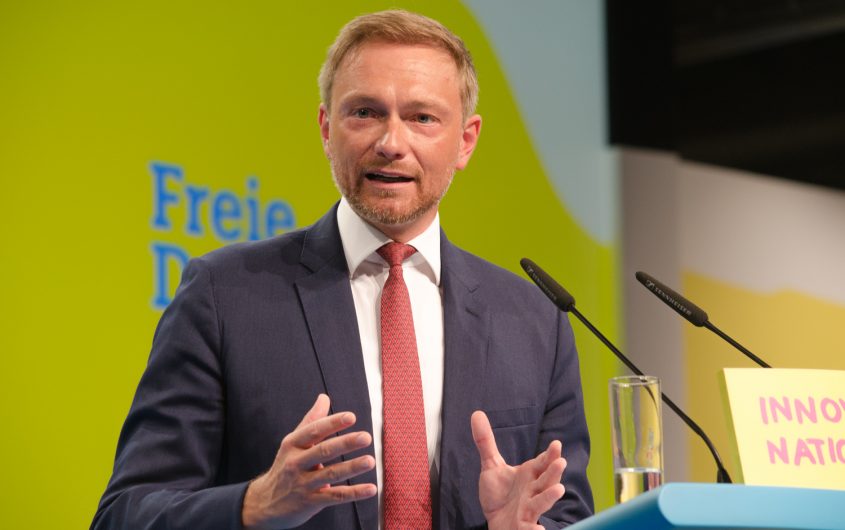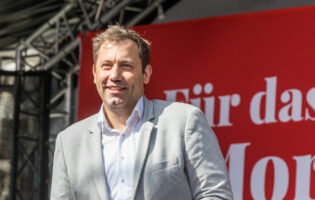
Freie Demokraten via Flickr
Looking at the Liberals

Jackson Janes
President Emeritus of AGI
Jackson Janes is the President Emeritus of the American-German Institute at the Johns Hopkins University in Washington, DC, where he has been affiliated since 1989.
Dr. Janes has been engaged in German-American affairs in numerous capacities over many years. He has studied and taught in German universities in Freiburg, Giessen and Tübingen. He was the Director of the German-American Institute in Tübingen (1977-1980) and then directed the European office of The German Marshall Fund of the United States in Bonn (1980-1985). Before joining AICGS, he served as Director of Program Development at the University Center for International Studies at the University of Pittsburgh (1986-1988). He was also Chair of the German Speaking Areas in Europe Program at the Foreign Service Institute in Washington, DC, from 1999-2000 and is Honorary President of the International Association for the Study of German Politics .
Dr. Janes is a member of the Council on Foreign Relations, the International Institute for Strategic Studies, the Atlantic Council of the United States, and American Purpose. He serves on the advisory boards of the Berlin office of the American Jewish Committee, and the Beirat der Zeitschrift für Außen- und Sicherheitspolitik (ZfAS). He serves on the Selection Committee for the Bundeskanzler Fellowships for the Alexander von Humboldt Foundation.
Dr. Janes has lectured throughout Europe and the United States and has published extensively on issues dealing with Germany, German-American relations, and transatlantic affairs. In addition to regular commentary given to European and American news radio, he has appeared on CBS, CNN, C-SPAN, PBS, CBC, and is a frequent commentator on German television. Dr. Janes is listed in Who’s Who in America and Who’s Who in Education.
In 2005, Dr. Janes was awarded the Officer’s Cross of the Order of Merit of the Federal Republic of Germany, Germany’s highest civilian award.
Education:
Ph.D., International Relations, Claremont Graduate School, Claremont, California
M.A., Divinity School, University of Chicago
B.A., Sociology, Colgate University
Expertise:
Transatlantic relations, German-American relations, domestic German politics, German-EU relations, transatlantic affairs.
__
The Electoral Chances of the FDP
Amidst the current speculation about the results of Germany’s September elections, much popular focus is on the contest between the Greens led by the young chancellor candidate Analena Baerbock and the conservative competitors in the CDU/CSU Union led by Armin Laschet. The guess is that these two parties will be able to form the next coalition government regardless of who is chancellor. Less media attention has been given to the Free Democrats (FDP), which might be needed as coalition partners to reach a majority. If the Greens were inclined to form a coalition with Social Democrats, the FDP would also be needed. But that scenario is less likely given the disinclination of the SPD to serve as a junior partner.
To be back in a coalition role would be highly important for the FDP to again reassert its role at the federal level of government. But to earn that chance, it must strengthen its brand, which at the moment is struggling.
That brand has been traditionally based on individual freedom and a light touch by government in a free-market economy. This philosophy attracted a core cluster of voters in the small-sized business community and the professional service sector which ensured representation of the party in the parliament for 64 years — with support fluctuating between 7 and 14 percent, usually averaging at 9-10 percent — until 2013 when it failed to reach the 5 percent hurdle for the first time. That loss shook the party to its core, but four years later it was able to secure another four years in the parliament by improving its support to over 10 percent. That same year it was close to returning to a governing coalition with Chancellor Merkel’s CDU and the Green Party, but the FDP leader Christian Lindner decided to decline the invitation and stay in opposition. That decision did not earn the party much credit in its wake, winning seats in most state parliaments but governing in only three.
At least for now, their strategy to criticize the government’s overreach in limiting individual rights while acknowledging the dangers of the pandemic has helped the FDP gain support in the polls.
During the past year, given the stringent lockdown policies supported by the current government in Berlin, the FDP has expressed its concern with government overreach curtailing the freedom of citizens and the resulting impact on the economy. The FDP several times took its case to the constitutional court or other courts and almost each time won its case against the federal or state governments. It remains to be seen how that dilemma will evolve by the time the elections are held in late September and after a majority of Germans return from their beloved summer vacations fully vaccinated. At least for now, their strategy to criticize the government’s overreach in limiting individual rights while acknowledging the dangers of the pandemic has helped the FDP gain support in the polls.
Should the FDP be invited to join one or the other of the two coalition possibilities, its negotiating power will be limited, assuming that its projected support would not rise above its current levels of 10-12 percent. A coalition led by Armin Laschet would be a friendlier partner, as he currently governs his own state of North Rhine-Westphalia with the FDP. Should the Greens head the government, the atmosphere would be less amicable, but pragmatism would presumably reign. The FDP would expect that it would command at least two to three ministries but the most important one would be one focused on digitalization.
However, should an invitation come to join the government with the Social Democrats and the Greens, forging such a coalition would be potentially more difficult. The Social Democrats and the Greens would be further left than the FDP, and as much as the FDP would want to rejoin a governing coalition, finding common ground would be a challenge for all three parties and their respective party bases.
Whether in government or in opposition, the party will need to develop and widen its reach into the electorate and forge a more diverse leadership to sustain its relevance in an uncertain future.
The fact that the FDP has been able to sustain its role amidst the ups and downs of recent decades is evidence that its supporters are still loyal. Much of that loyalty was forged by the leadership of the party: people like Thomas Dehler, Walter Scheel, Theodore Heuss, Gerhard Baum, Hans Dietrich Genscher, Klaus Kinkel, Otto Graf Lambsdorff, Sabine Leutheusser-Schnarrenberger, among others, all veterans of the first four decades of the Federal Republic. Since unification in 1990, the FDP has been unable to extend and establish a strong base in eastern Germany, and it remains in the opposition seats in most of the western Länder. The party stumbled badly in Thuringia in 2020 when a state election resulted in the FDP candidate Thomas Kemmerich was initially elected as minister-president with the support of the far-right AfD. Kemmerich quickly resigned, but the incident was a national embarrassment for the party.
The current FDP leader Christian Lindner has dominated the spotlight as party spokesman during his tenure, following his predecessor Guido Westerwelle, who managed to secure a role for the FDP as a coalition partner with Angela Merkel for one term in 2009. The results of the 2017 elections were clearly more successful than the debacle of 2013. But Lindner’s future will now depend on the results in September. Whether in government or in opposition, the party will need to develop and widen its reach into the electorate and forge a more diverse leadership to sustain its relevance in an uncertain future.
The primary question surrounding the limits of the FDP’s attraction is whether that is attributable to its message or its messengers amidst so many challenges and choices ahead for Germany in domestic and foreign policy realms. The FDP was at various times the primary steward of German foreign and economic policy over many decades in different coalitions in ever-changing circumstances of the Federal Republic. What impact the party can and will have depends on its ability to make a persuasive case to Germans that its influence is needed in a coalition government and on its capacity to make itself relevant to its coalition partners with which it is now competing.
When Christian Lindner opted to reject the opportunity to join a coalition with Angela Merkel and the Greens in 2017, his justification was “it is better not to govern than to govern in the wrong way.” Most observers say that Lindner will not repeat that motto if an opportunity presents itself in September. But whether the FDP is in government or opposition, it will still be confronting the same challenges faced by all political parties in making their case to a country adjusting to a post-Merkel era and uncertainties in the wake of an ongoing pandemic, economic disruption, and tectonic shifts in the global arena. The FDP played a significant role in dealing with such challenges in the past. Voters in September will decide whether and how it is still needed.









